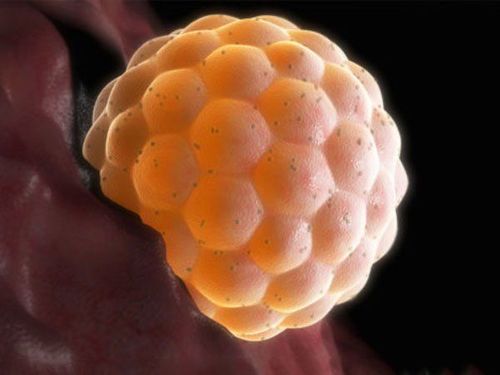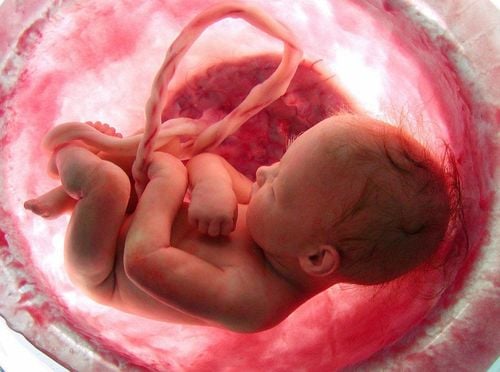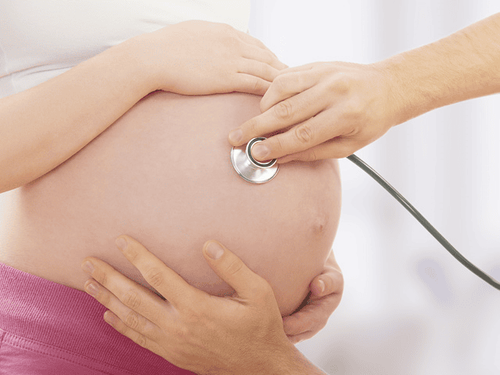This is an automatically translated article.
Ovulation is the result of genetic problems when the sperm fertilizes the egg. This pathology is sometimes detected during an early pregnancy ultrasound. Since the condition is unusual and not well known in the community, it can be shocking, especially if you're still pregnant and nearing the end of your pregnancy. Although most women can go on to have healthy pregnancies after treatment, safe methods of birth control can help manage pregnancy more fully.
1. What is egg pregnancy?
An ovum pregnancy occurs when an egg and sperm combine incorrectly during fertilization and a noncancerous tumor forms instead of a healthy placenta. This tumor cannot support the developing embryo and the pregnancy will quickly end.
Fetal ovum is a type of trophoblastic disease in pregnancy. In the case of an ectopic pregnancy, a tumor develops in the uterus and forms as fluid-filled cysts resembling clusters of grapes.
Although an egg pregnancy is very rare, anyone can get an egg pregnancy. You are more likely to have an egg pregnancy if you:
Under 20 years old Over 40 Have a history of egg pregnancy Have had more than two miscarriages
2. The classification of fetal ovum
Pregnancy eggs are divided into two types, complete and partial.
In complete ovum pregnancies, the tissue that makes up the placenta is abnormal and there is no embryo. The tumor still forms and produces the pregnancy hormone hCG, which is produced by a healthy placenta during a normal pregnancy. hCG levels are measured with multiple pregnancy test strips.
In contrast, a partial ovum pregnancy occurs when an abnormal placenta forms along with the embryo. In these cases, the embryo has severe birth defects. The tumor grows rapidly beyond the embryo.
3. What causes egg pregnancy?
Pregnancy is an egg pregnancy that results when specific genetic errors occur during the fertilization of an egg with a sperm.
In a healthy pregnancy, the placenta forms to nourish the developing embryo. With an egg pregnancy, instead of the placenta, a tumor forms inside the uterus. The developing embryo is almost never associated with pregnancy.
Occasionally, an ectopic pregnancy can also develop after a miscarriage, a successful pregnancy, or an ectopic pregnancy, when cells are still in the uterus.
4. What are the symptoms of egg pregnancy?
The most common ectopic pregnancy symptoms during pregnancy include:
Unusual vaginal bleeding in the first trimester Severe nausea and vomiting. Preeclampsia (extremely high blood pressure) High hCG levels Increase in belly size much faster than during a healthy pregnancy No heartbeat or fetal movement Grape-like water capsules freely exit the vagina
5. How to diagnose and treat ectopic pregnancy?
Your doctor diagnoses an ectopic pregnancy by ultrasound of your uterus. An ultrasound uses sound waves to create images of the uterus and its contents. Your doctor may also recommend blood tests to check your HCG levels.
Most cases of ectopic pregnancy go away on their own. In these cases, the grape-like cysts come out of the uterus and through the vagina spontaneously. Conversely, if the gestational sac is too large, ectopic pregnancy removal treatment should be instituted promptly, including dilation and curettage of the ovum along with suction to remove all abnormal tissue from the uterus.
In rare cases, a woman needs to have a total hysterectomy to treat the pregnancy completely.
6. What complications are related to oocyte pregnancy?
Sometimes, portions of the oocyte remain in the uterus after spontaneous termination of pregnancy or after treatment. In these cases, persistent gestational trophoblastic disease may develop.
Persistent gestational trophoblastic disease means that initial surgery to remove the abnormal cells has failed. When this happens, cells from the oocyte have grown through the muscular layer surrounding the uterus, called an invasive oocyte.
In rare cases, persistent gestational trophoblastic disease can cause a type of cancer that begins in the uterus and can travel to other organs in the body. Doctors can take a chest X-ray to determine if the egg has spread to the lungs. If ovarian cancer has spread, you may need cancer treatments such as chemotherapy.
7. Is there any way to prevent pregnancy?
So far, there is absolutely no way to prevent pregnancy.
However, a safe way to prevent pregnancy has been considered as early detection and radicalization from the beginning. To do so, every pregnant woman needs adequate maternity management, from the moment she knows she can become pregnant.
Also, if you've had an egg pregnancy before, another way to prevent pregnancy that can reduce the chance of complications is to avoid another pregnancy for a year after finding out. In addition, your doctor will closely monitor your HCG levels once a month for up to a year to help make sure there is no trace of an egg in your uterus.
In a nutshell, ectopic pregnancy is a rare form of pregnancy loss where the fetus is unable to develop. However, women can continue to have healthy pregnancies after an egg pregnancy, and the risk of miscarriage is not increased. Thus, although fortunately most women who receive treatment for an uncomplicated ovum will leave no sequelae or further risk of pregnancy, if knowledge about how to safely prevent an ectopic pregnancy is known. Women will be aware of early antenatal check-ups, not only detecting pregnancy and timely radical treatment, but also helping to manage a healthy and safe pregnancy for mother and child.
The first antenatal check-up when the period is late and regular antenatal check-ups are considered as one of the measures to prevent pregnancy. Vinmec International General Hospital currently has many maternity packages (12-27-36 weeks), in which the 12-week maternity package helps monitor the health of mother and baby right from the beginning of pregnancy, early detection. and timely intervention in health problems.
Please dial HOTLINE for more information or register for an appointment HERE. Download MyVinmec app to make appointments faster and to manage your bookings easily.













